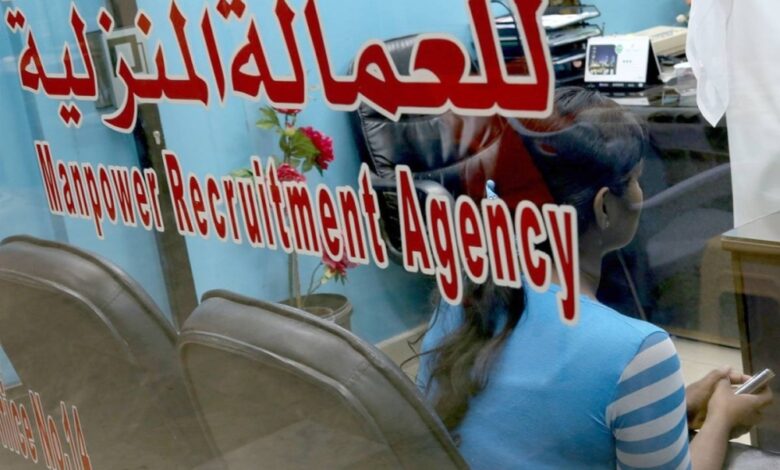Domestic agencies appeal for price adjustment in worker recruitment
Scores of domestic labor recruitment office and company owners stressed that the current recruitment prices do not reflect the real costs of labor acquisition, which are the lowest compared to most Gulf countries.

Scores of domestic labor recruitment office and company owners, registered in the country, collectively filed a grievance with Minister of Commerce and Industry, Abdullah Al-Joaan.
The grievance pertains to Ministerial Resolution No. (2/2024), which amends certain provisions of Ministerial Resolution No. (103/2022) regarding the pricing of recruiting domestic workers. They urge the minister to reconsider the decision, citing violations of legal provisions, unfair treatment, threats to business continuity, and the potential for closure or bankruptcy.
According to the grievance, the complainants stated that the decision of the former Minister of Trade, referenced above, which set the recruitment cost for domestic workers based on nationality (750 dinars for Asian labor, 575 for African, and 350 for special passports), was issued amidst the resignation of the previous government.
They explained that the resigned government was only handling urgent matters, and the pricing decision did not fall under such matters, especially as it involved multiple parties beyond just the Ministry of Commerce.
They further argued that the decision required thorough study before publication, including consultation with stakeholders and the union representing them, which never occurred.
Closure and bankruptcy
The complainants explained that if the expected profit margin for recruitment offices and companies is calculated in accordance with the first article of Law No. (19/2016) issued regarding the establishment of domestic labor companies, and at 10 percent of the recruitment cost determined by the “Trade” decision, it would be as follows: 75 dinars for Asian labor, 57 for African, and 35 dinars for special passports.
They questioned whether this profit margin would be sufficient to cover the costs and expenses of operating offices and companies, including salaries and monthly wages for their employees.
“Indeed, this margin will not suffice to cover the fundamental expenses of the offices, including monthly rents, employee wages, housing costs, and rents for recruited labor housing. Additionally, government fees for license renewals, advertising, and other expenses cannot be covered under this decision. Consequently, this situation strongly inclines us towards closure and bankruptcy, jeopardizing our ability to recruit hundreds of new domestic workers and potentially leading to a crisis in their numbers in the near future,” the complainantssaid.
They stressed that the current recruitment prices do not reflect the real costs of labor acquisition, which are the lowest compared to most Gulf countries. This is despite dealing with a large number and diversity of countries to export new labor from, while Kuwait only deals with two countries, with the rest either suspended or unwilling to engage with Kuwait.
Special passports
The complainants stated that the decision made by the “Trade” set the recruitment cost at 350 dinars per passport, despite the absence of an approved employment contract model by the Public Authority for Manpower. They questioned how recruitment could proceed in the absence of this form that regulates the issue.
They further explained that in the event of recruitment according to this mechanism and without a contract, the local office would be subject to legal accountability as per Article of Law No. (68/2015) issued on domestic workers.
They highlighted that, for instance, the Sri Lankan embassy in Kuwait sets the recruitment cost with a special passport at 479 dinars, excluding the ticket and additional administrative expenses upon arrival. This raises the question: who bears the significant disparity between the ministry’s specified recruitment price and the actual cost?
The complainants stressed that this example confirms beyond any doubt that the price decision was issued without the slightest prior study, and from people who are not specialized and unfamiliar with the domestic labor market.
Urgently, they called on minister Al-Jawaan to suspend the current decision until its terms are reevaluated with the assistance of specialists to establish a real and equitable recruitment cost that considers all stakeholders in domestic labor.












